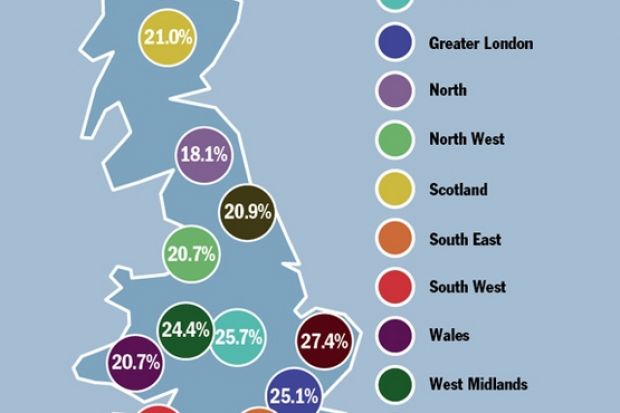Regionally focused universities in the North of England could find demand for courses hit particularly hard when higher tuition fees are introduced, new survey findings suggest.
A national poll of more than 18,500 people suggests that a significant north-south divide exists in the proportion of the population that supports the coalition government's policy of trebling the tuition fee cap to replace the loss of teaching funding from the state.
Although in total many more of the survey's respondents opposed the change (60.2 per cent) than approved of it (24.1 per cent), only 18.1 per cent supported the plans in the North of England, and the proportion was just 20.7 per cent in the North West.
However, all regions in the south of the country had more than a quarter in favour - in the South East it was .8 per cent, in East Anglia .4 per cent, in the South West per cent and in Greater London 25.1 per cent.
Paul Whiteley, professor of government at the University of Essex, who obtained the figures as part of research into voter behaviour during the alternative vote referendum, said the findings had important implications for institutions with strong regional recruitment.
This would also take on much more significance, he said, given the increasing likelihood that a perceived increase in the cost of going to university might make students decide to study closer to home.
"As fees go up, that regional dimension to recruitment may become quite important, and it is going to disadvantage the northern universities compared with the south," he said.
Professor Whiteley added that post-1992 institutions were at greater risk given their tendency to recruit students from local communities.
Other analysis of the results also confirms a strong correlation between income and attitudes to fee rises, with only 16 per cent of respondents from families earning less than £5,000 a year approving of increases, as opposed to 32 per cent from households bringing in £100,000 or more.
Professor Whiteley said this could be early evidence that demand among those from poorer backgrounds would be heavily affected.
"It means, by implication, that poorer people are likely to be deterred by this. It is going to translate to some extent into their own lives," he said.
The picture is a little more complex once occupational background is taken into consideration - with professionals such as teachers, judges and doctors less likely to support the plans (22.3 per cent) than those in managerial business roles (31.7 per cent).
There are also significant gaps in gender - with 29.2 per cent of men approving of the shift to higher fees, a full 10 percentage points higher than women (19.2 per cent) - and age, where the retired are the most likely to approve.
Professor Whiteley said the figures, from research carried out by the polling company YouGov, may reinforce any Liberal Democrat worries about their future electoral performance being hit heavily by the wrangle over fees.
Less than a fifth (17.2 per cent) of those who supported the party at the 2010 general election approved of the coalition government's policy and subsequent fee rises, compared with 41.6 per cent of those who voted Conservative.
